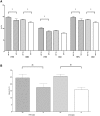Ascorbic acid lowers central blood pressure and asymmetric dimethylarginine in chronic kidney disease
- PMID: 30094018
- PMCID: PMC6070083
- DOI: 10.1093/ckj/sfx158
Ascorbic acid lowers central blood pressure and asymmetric dimethylarginine in chronic kidney disease
Abstract
Background: Premature cardiovascular disease in patients with chronic kidney disease (CKD) is not explained by traditional risk factors and oxidative stress may contribute via endothelial and vascular dysfunction. We investigated the effect of ascorbic acid on oxidative stress and vascular function in CKD patients compared with controls with hypertension (HTN).
Methods: A crossover study of intravenous saline and ascorbic acid was conducted. Biomarkers of oxidative stress were measured, while pulse wave analysis and brachial flow-mediated dilatation were performed to assess large artery and endothelial function.
Results: Twenty HTN and 30 CKD patients Stages 3-5 were recruited. Serum ascorbic acid was significantly lower in patients with CKD. In both groups, ascorbic acid significantly increased total antioxidant potential and superoxide. Asymmetric dimethylarginine (ADMA) was reduced significantly by ascorbic acid in the CKD group and on multivariate regression analysis, age and the presence of CKD were predictors of ADMA response to ascorbic acid. Although no effect on FMD was observed, central blood pressure and augmentation index were reduced significantly in both groups.
Conclusions: Ascorbic acid has pro- and antioxidant effects, reducing central blood pressure and augmentation index in HTN and CKD. Ascorbic acid reduces serum ADMA in CKD, which may have longer-term benefits.
Keywords: antioxidants; arterial stiffness; chronic kidney disease; endothelial dysfunction; oxidative stress.
Figures


References
-
- Culleton BF, Larson MG, Wilson PW. et al. Cardiovascular disease and mortality in a community-based cohort with mild renal insufficiency. Kidney Int 1999; 56: 2214–2219 - PubMed
-
- Go AS, Chertow GM, Fan D. et al. Chronic kidney disease and the risks of death, cardiovascular events, and hospitalization. N Engl J Med 2004; 351: 1296–1305 - PubMed
-
- Simmons EM, Langone A, Sezer MT. et al. Effect of renal transplantation on biomarkers of inflammation and oxidative stress in end-stage renal disease patients. Transplantation 2005; 79: 914–919 - PubMed
-
- Yilmaz MI, Saglam M, Caglar K. et al. Endothelial functions improve with decrease in asymmetric dimethylarginine (ADMA) levels after renal transplantation. Transplantation 2005; 80: 1660–1666 - PubMed
LinkOut - more resources
Full Text Sources
Other Literature Sources

